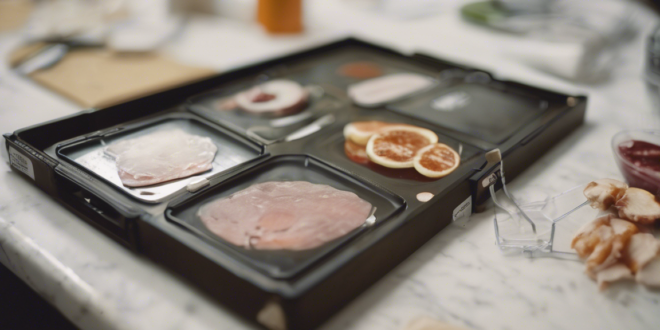From Textbooks to Cutting Boards: How Alabama Medical Students Are Revolutionizing Nutritional Education
In a groundbreaking approach to medical education, students at the University of Alabama are stepping out of traditional classrooms and into kitchen laboratories, transforming the way future healthcare professionals understand nutrition’s critical role in patient care. This innovative program is challenging long-standing medical education paradigms by providing hands-on culinary training that bridges the gap between theoretical knowledge and practical nutritional intervention.
The Critical Gap in Medical Nutrition Education
For decades, medical schools across the United States have struggled with comprehensive nutrition education. Despite nutrition being a fundamental aspect of preventive healthcare and treatment, most medical programs dedicate less than 25 hours to nutritional training throughout their entire curriculum. This stark reality has created a significant knowledge gap among healthcare professionals, leaving patients without critical dietary guidance that could dramatically improve their health outcomes.
Alabama’s Innovative Kitchen Classroom Approach
The University of Alabama’s medical program has developed a pioneering curriculum that places students directly in kitchen environments, transforming how they learn about nutrition. Unlike traditional lecture-based approaches, these medical students are learning to chop vegetables, prepare balanced meals, and understand the intricate relationship between food preparation and health in real-world settings.
Dr. Emily Richardson, the program’s lead director, explains, “We’re not just teaching students about nutrients on a theoretical level. We’re showing them how actual meals can be constructed to address specific health conditions, from diabetes management to heart disease prevention.”
Hands-On Learning: More Than Just Cooking
The kitchen-based program goes far beyond basic cooking skills. Students learn comprehensive skills including:
• Nutritional composition analysis
• Cultural dietary considerations
• Meal planning for diverse health conditions
• Understanding food’s impact on metabolic processes
• Practical cooking techniques for health optimization
Addressing Health Disparities Through Nutrition
Alabama, known for high rates of obesity and diet-related chronic diseases, provides a critical backdrop for this innovative educational approach. The state’s significant health challenges make nutrition education not just academic, but a matter of public health urgency.
Research consistently shows that communities with healthcare providers who understand nutrition are more likely to see improved patient outcomes. By training medical students in practical nutritional intervention, the University of Alabama is directly addressing systemic health inequities.
Technology Meets Culinary Education
The program incorporates cutting-edge technology to enhance learning. Students use digital nutritional tracking tools, metabolic analysis software, and advanced cooking equipment that allows them to quantify and understand nutritional impacts in real-time.
Advanced sensors and smart kitchen technology help students measure precise nutritional content, glycemic indices, and potential health impacts of different meal compositions. This technological integration ensures that students aren’t just learning cooking skills, but developing a data-driven approach to nutritional healthcare.
Student Perspectives: Transforming Medical Training
Medical students in the program report profound shifts in their understanding of healthcare. Jordan Martinez, a second-year medical student, shared, “Before this program, nutrition seemed like a peripheral topic. Now I see it as a fundamental intervention strategy that can be as powerful as any pharmaceutical treatment.”
The experiential learning approach allows students to connect theoretical medical knowledge with practical nutritional strategies, creating a more holistic understanding of patient care.
Broader Implications for Medical Education
The University of Alabama’s program represents a potential paradigm shift in medical education. As healthcare increasingly recognizes the importance of preventive strategies and lifestyle interventions, such innovative educational models could become standard across medical schools nationwide.
Early data suggests significant improvements in students’ nutritional knowledge, patient communication skills, and overall understanding of diet’s role in health management. These promising results could inspire similar programs in medical institutions across the country.
Challenges and Future Directions
While groundbreaking, the program isn’t without challenges. Integrating comprehensive kitchen-based training requires significant resources, specialized instructors, and a reimagining of traditional medical curriculum structures. However, the potential long-term benefits for patient care make these investments worthwhile.
Future expansions might include specialized tracks focusing on specific dietary interventions for complex health conditions, further technological integration, and collaborative research exploring the program’s impact on patient outcomes.
Conclusion: A New Recipe for Medical Education
The University of Alabama’s innovative approach represents more than just a novel educational method—it’s a comprehensive reimagining of how healthcare professionals understand nutrition’s role in treatment and prevention. By bringing medical students into the kitchen, the program is cooking up a healthier future, one balanced meal at a time.
As healthcare continues to evolve, programs like these remind us that sometimes the most profound medical interventions start with something as simple as understanding what’s on our plates.
 Good Calories Guide GoodCalories Guide focuses on nutrition, healthy eating, and overall wellness. The site offers practical insights into evidence-based dietary practices, including tips for specific lifestyles such as veganism, keto, and family-friendly meal planning. It also addresses unique nutritional needs for individuals with conditions like diabetes or food allergies, while providing quick and accessible recipes to make healthy living a sustainable and enjoyable choice.
Good Calories Guide GoodCalories Guide focuses on nutrition, healthy eating, and overall wellness. The site offers practical insights into evidence-based dietary practices, including tips for specific lifestyles such as veganism, keto, and family-friendly meal planning. It also addresses unique nutritional needs for individuals with conditions like diabetes or food allergies, while providing quick and accessible recipes to make healthy living a sustainable and enjoyable choice.


